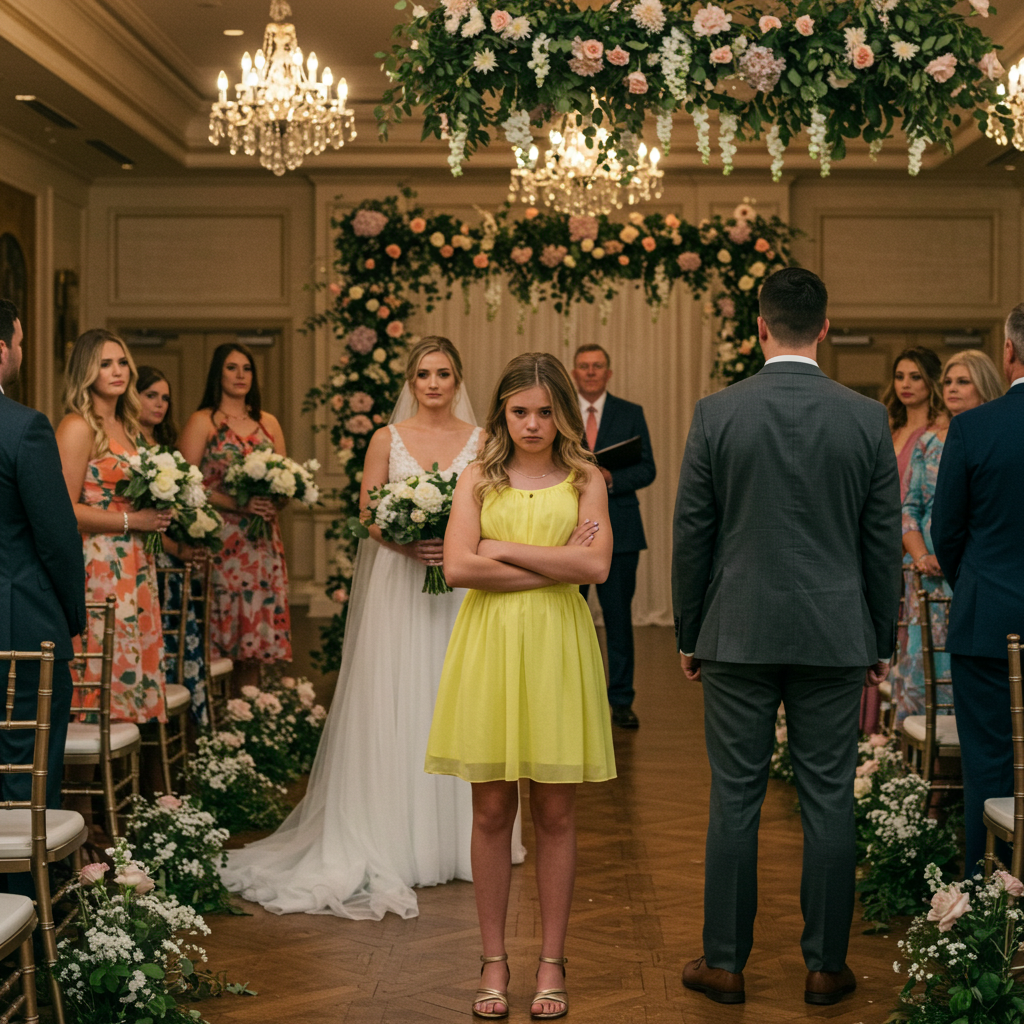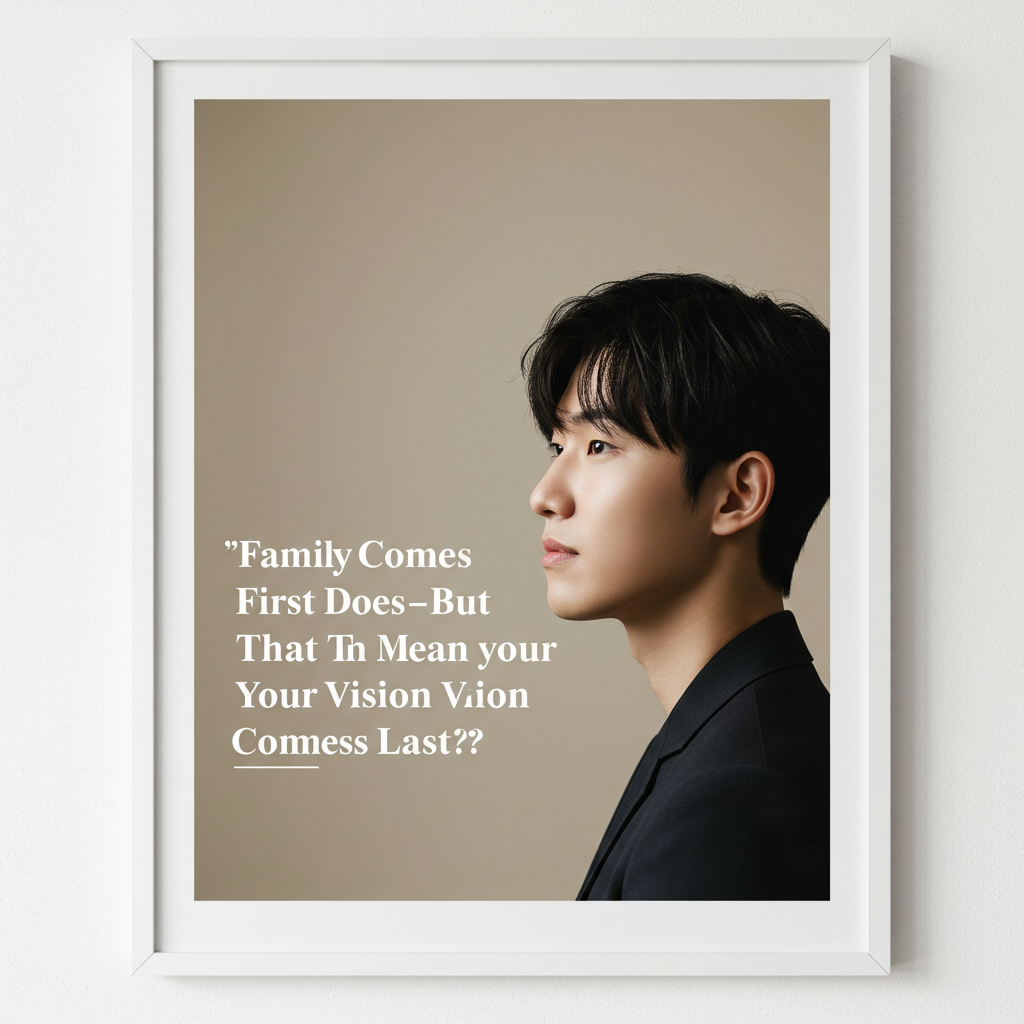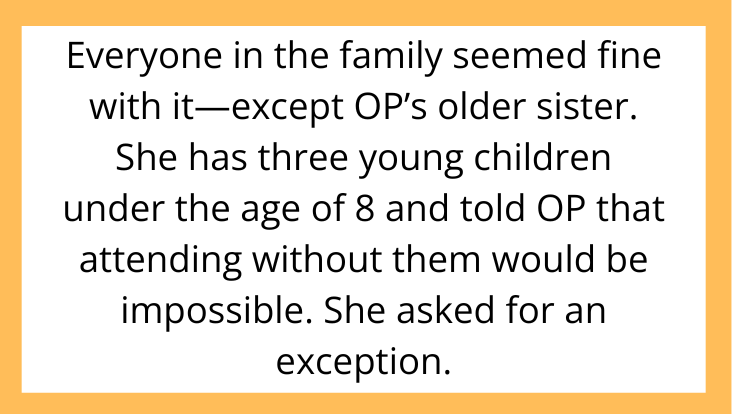Am I the Jerk for Not Letting My Sister’s Kids Come to My Child-Free Wedding?
Weddings are often seen as joyful celebrations—but when family expectations clash with personal boundaries, things can spiral quickly. A Reddit user in the r/AITAH community faced exactly that dilemma when they decided to have a child-free wedding and their sister did not take it well.
This post explores the emotional minefield of wedding planning, family boundaries, and whether you’re in the wrong for setting limits on your big day.
The Situation: A Dream Wedding, Minus the Chaos

The Original Poster (OP) shared that they had been planning their wedding for over a year. One of their biggest wishes? A child-free event. The goal was to keep things elegant, quiet, and focused on adult celebration—something many couples are now opting for.
Everyone in the family seemed fine with it—except OP’s older sister. She has three young children under the age of 8 and told OP that attending without them would be impossible. She asked for an exception.
When OP said no, she accused them of being inconsiderate and “dividing the family.” Other relatives chimed in, saying OP should be more flexible “because family comes first.”
Now OP is left wondering: Am I the jerk for sticking to my child-free wedding even though it means my sister may not come?
Boundaries at Weddings: Who Gets to Set the Rules?

Your Wedding, Your Choice
Planning a wedding involves hundreds of decisions, and every couple is entitled to set the tone they want. Whether it’s about venue, dress code, food—or in this case, a child-free policy—those decisions should be respected.
OP and their partner chose a child-free wedding to maintain a certain atmosphere. That’s a personal preference, not an attack on parents or children.
A wedding is not public property. If guests can’t or don’t want to attend under the couple’s terms, that’s their choice. But the rules of the event still stand.
Why Child-Free Weddings Are Becoming More Common

While controversial to some, child-free weddings have gained popularity for practical and emotional reasons:
-
Reduced noise and distractions
-
Better control over guest numbers and seating
-
Increased comfort for non-parent guests
-
Lower stress for the couple
For OP, it wasn’t about excluding their sister—it was about protecting the atmosphere they envisioned for one of the most important days of their life.
The Family Fallout: When Expectations Clash with Boundaries

“Family Comes First”—But At What Cost?
OP’s sister invoked the classic guilt-trip phrase: “Family comes first.” But what does that really mean?
Does putting family first mean overriding your own needs? Should it mean compromising your mental peace and emotional vision for your wedding?
Redditors weighed in with a strong opinion: Respect goes both ways. Just as OP should respect their sister’s choice not to attend, the sister should respect the child-free policy rather than trying to override it.
Guilt vs. Grace: How to Respond Without Giving In
Family pressure can be intense. In OP’s case, not only the sister but other relatives began calling them selfish.
So how do you respond without caving?
Some suggested OP could reaffirm their love for the kids and offer alternatives:
-
Arrange a separate family-friendly brunch before or after the wedding
-
Send a care package or video message to the kids
-
Organize a casual get-together where children are welcome
These are thoughtful compromises that still protect the sanctity of the wedding itself.
Are Exceptions Ever Fair?

The Problem with Making One Exception
OP’s biggest concern about letting the sister’s children attend? The precedent it would set.
If one guest gets an exception, it can spark resentment among others who followed the rules. Suddenly, the carefully planned guest list starts unraveling.
Many couples face this exact problem: One “small” favor turns into a slippery slope of accommodations.
Equal Rules for All Guests
Fairness matters. If you say no children, it needs to apply to everyone. This helps avoid conflict, favoritism, and hurt feelings across the board.
OP’s stance was clear, respectful, and consistent. That’s not being inflexible—it’s being fair.
What the AITAH Community Decided

Reddit’s judgment? Not the jerk—and here’s why.
“Child-free means child-free. She’s not entitled to special treatment just because she’s your sister.”
“Your wedding is not a daycare. She can either get a babysitter or stay home. That’s her call.”
“This is about your day, not her convenience. Stick to your boundary.”
The community overwhelmingly supported OP’s decision and encouraged them not to feel guilty for protecting the tone of their wedding.
Final Thoughts: Choosing Peace Over Pressure

Weddings are deeply emotional, but they also require clear boundaries. OP wasn’t rejecting their sister or her children—they were protecting their vision for a once-in-a-lifetime moment.
In today’s world, where people are finally learning to set healthy boundaries, it’s important to remember: You are not obligated to sacrifice your joy to avoid someone else’s discomfort.
Saying “no” isn’t selfish. Sometimes, it’s the most loving thing you can do—for yourself and your future marriage.



